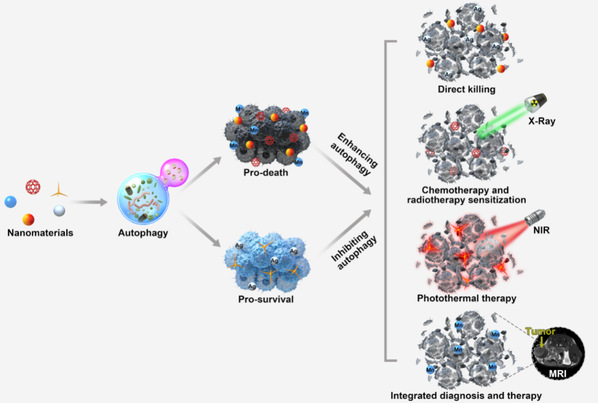Recently, professor Wen Longping and associate professor Zhang Yunjiao in the school of medicine and institute of life sciences of south China University of Technology are invited to publish the paper pro-death or pro-survival Contrasting Paradigms on Nanomaterial - Induced Autophagy and Exploitations for Cancer Therapy in Accounts of Chemical Research (impact factor 21.661) a top international journal. The review paper (DOI: 10.1021 / acs. Accounts. 9 b00397), reports that research development in recent 15 years and reviews in nanomaterials induced cell Autophagy regulation effect of fate, the progress of the mechanism and application in tumor treatment.

Cancer is a serious disease that terribly affects human health. With the rapid development of nanotechnology, the application of nano-drugs in the diagnosis and treatment of cancer has made great progress. Autophagy is a key biological process for cell homeostasis. In 2016, scientist yoshinori ohsumi won the Nobel Prize in physiology or medicine for his discovery of autophagy. The low level of basal autophagy in cells is helpful to maintain its homeostasis. However, under the stress of many physical, chemical and biological pathological factors, the level of autophagy in cells tends to be significantly increased. Such excessive and abnormal autophagy can negatively affect cells and even cause cell death. Recent studies have found that autophagy induced by nanomaterials is a universal mechanism of cell response to nanomaterials. Wen Longping professor and associate professor of Zhang Yunjiao team has been committed to regulating cell autophagy nanomaterials research. Under the support of the national ministry of science and technology 973 project (2013 cb933900), they find that different nanomaterials induced autophagy for cell fate has the opposite effect (promote death or survival). Its specific mechanism is discussed, and two very different types of autophagy are developed nano drug through regulating autophagy that promotes the new strategy for cancer treatment. The research results have been published in a series of high-level papers, such as Nature Mater. 2012, 11, 817-826; Nature Commun. 2018, 9, 4236; Funct. Mater. 2013, 23, 1534-1546; Funct. Mater. 2013, 23, 5930-5940; ACS Nano 2014, 8, 6131-6144; Autophagy, 2009, 5, 1107-1117; Autophagy, 2010, 6, 310-311; Autophagy, 2014, 10, 2006-2020; Biomaterials, 2013, 34, 10172-10181; Small 2010, 5, 2784-2787; Small 2017, 13, 1602876; Small 2018, 14, 1703711 et al.
Professor Wen Longping is the corresponding author of this paper. Associate professor Zhang Yunjiao is the first author and co-corresponding author. Professor Gao Jinhao of Xiamen University is the co-corresponding author, and associate professor zhang zhang of Anhui Medical University is the co-first author. South China University of Technology is the first author unit. The paper is supported by the national key research program, the national natural science foundation of China, the Pearl River innovation team of Guangdong province, and the Guangdong Outstanding Youth Fund. (picture and text/Zhang Yunjiao, medical school)
The thesis links: https://pubs.acs.org/doi/10.1021/acs.accounts.9b00397

